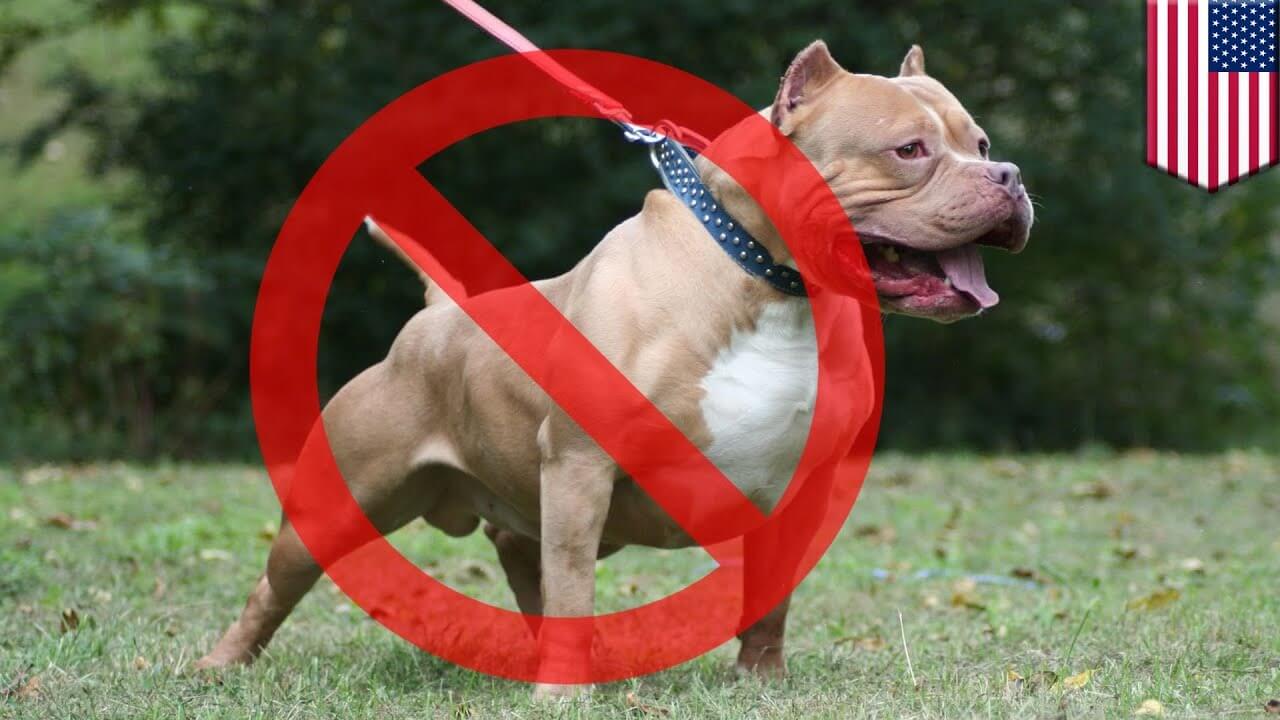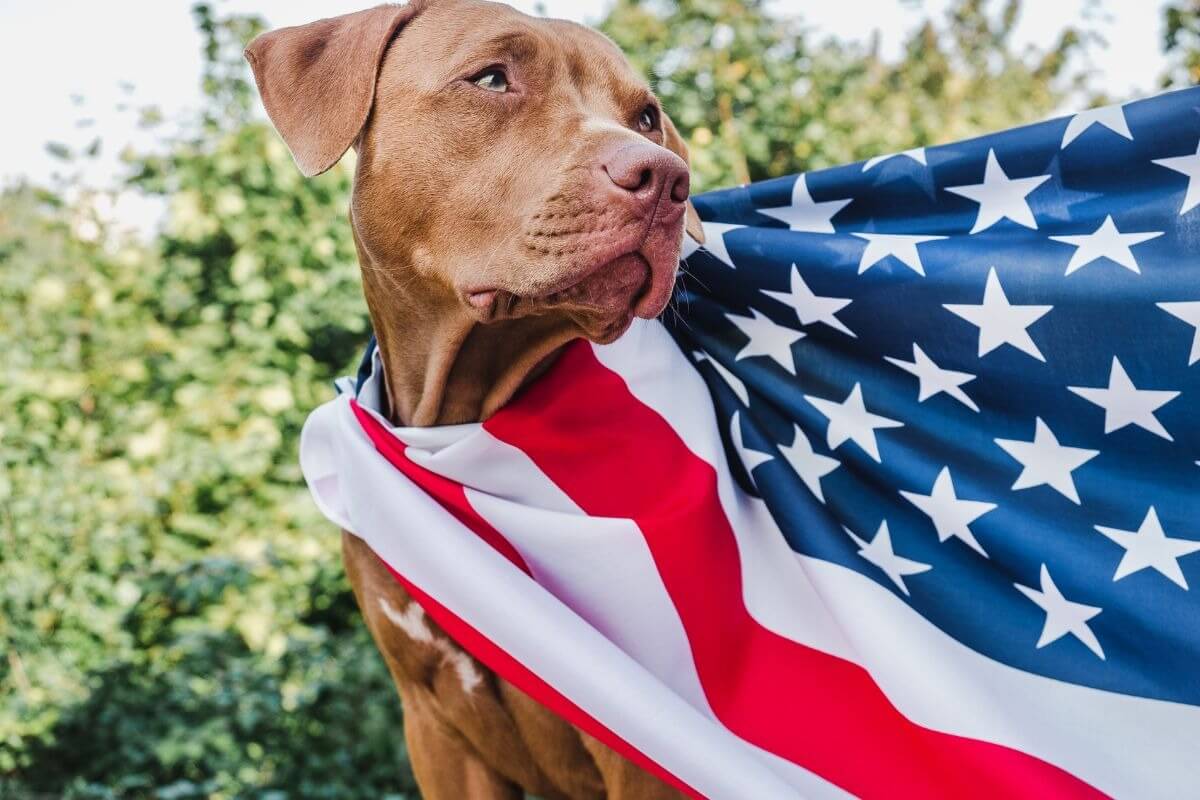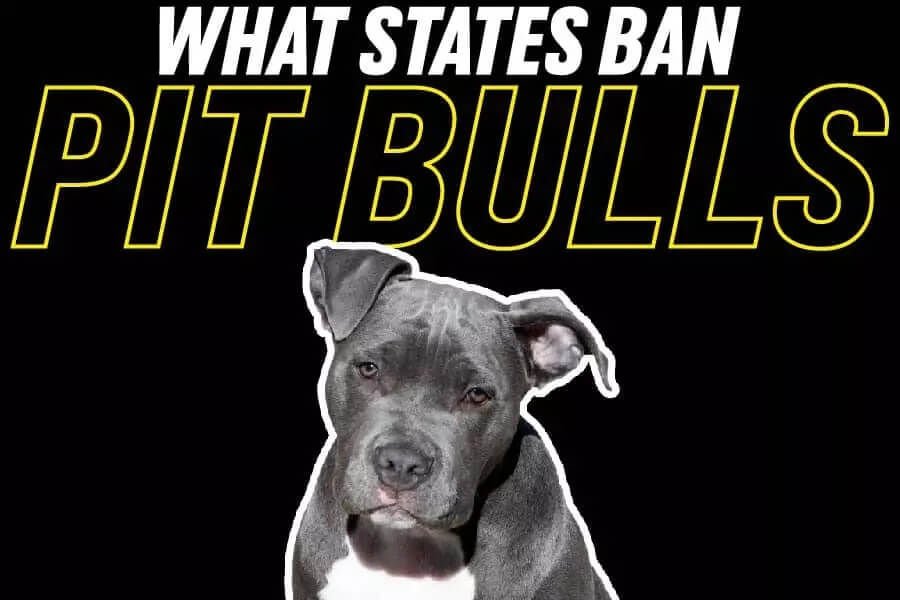Pitbulls are a breed of dog that no one is unfamiliar with when they hear its name. Some people, when they hear about this dog, are very fond of it and want to adopt it, but on the contrary, when they hear the name of this dog, they just want to stay away, even adults remind children to stay away from it. In some cities of the United States you may receive calls from the police that your Pitbulls are illegal. So, where are Pitbull banned and why? Let’s started.
Maybe you like: All you need to know about Pitbull
Understanding Breed-Specific Legislation: What It Is And Why It Exists

Breed-specific legislation, or BSL, is a set of laws and regulations that restrict or ban certain dog breeds from living in certain areas. Pit bulls are one of the most commonly banned breeds under BSL. The rationale behind BSL is to protect public safety by controlling dogs deemed dangerous based on their breed. However, critics argue that BSL unfairly targets specific breeds and ignores that any dog can be dangerous if not properly trained or socialized.
Additionally, many studies have shown that breed does not necessarily determine a dog’s behavior. As a result, some communities have repealed their BSL laws in favor of more effective measures such as leash laws and responsible pet ownership education. It is essential for individuals to educate themselves on the facts about dog behavior and to advocate for fair and effective policies regarding all breeds of dogs.
Why Are Pit Bulls Banned?
The main reason Pitbulls are banned in some parts of the United States is that their attacks can be fatal to both humans and other animals.
Media reports about Pitbull attacks and the fact that Pitbulls were originally bred for fighting.

Too strong
Their attacks are very dangerous to others because they are very violent. They bite with a very strong force, Although their teeth are not very sharp, their bites cause very serious injuries. Moreover, Just grabbing the prey with a fast speed, the possibility of death. Compared to other dog breeds, pitbulls are considered the strongest and most dangerous dogs.
Danger to society
They are too strong for the owner to handle in time. This is often seen in Pitbull attacks, with people claiming the dog has strayed away from its owner and is out of control.
You can follow more information about Pitbull ban in here
Why Pitbulls Are Often Targeted By Banning Laws
Pitbulls have been controversial and debated for years, with many cities and countries implementing laws to ban or regulate the breed. The reason behind these laws is the belief that pitbulls are inherently dangerous dogs. However, this belief is not supported by scientific evidence as there is no specific breed that can be labeled as dangerous. Instead, it’s the dog’s environment, training, and socialization that determines their behavior.

Despite this fact, pitbulls have been targeted by banning laws due to their history of being bred for dogfighting. This has led to a negative stigma surrounding the breed and increased media attention on pitbull attacks.
However, statistics show that other breeds such as German Shepherds and Rottweilers are responsible for more bites than Pitbulls. Banning laws also create problems for responsible owners who are forced to give up their pets or move out of certain areas.
Where Are Pitbulls Banned In The US? A State-By-State Overview
Pitbulls are a breed of dog that has been controversial for many years. Due to their reputation as aggressive animals, some states and cities in the United States have placed bans or restrictions on them. The laws regarding pitbulls vary from state to state, with some states having a complete ban on owning them while others only restrict certain activities such as breeding or require special permits.

For example, in Michigan and Pennsylvania, pitbulls are not banned statewide but individual cities may have their own restrictions. In California, there is no statewide ban but some cities like San Francisco and Beverly Hills prohibit ownership. On the other hand, states like Iowa and Kansas have no breed-specific legislation at all.
More specifically, PitBulls and other bullies are banned or legalized in hundreds of cities across 37 states. Each of these has some form of BSL. The states listed below have nearly all statewide bans on PitBulls.

California
If you want to adopt a pitbull dog living in California, you will need to:
License your dog,
Have them fully vaccinated with vaccines as required by law
Keep them indoors, in a fenced yard or in an enclosed space (e.g. barn),
Chained and even muzzled when out in public.
Some counties in the state of California will even include castration or castration in their regulations.
Colorado
In Colorado, Pitbulls are banned in the city of Denver. Denver isn’t the only Colorado city to ban pit bull ownership. Several other cities in the state also have breed restrictions specifically for pit bulls: Aurora, Commerce City, Fort Lupton, Lone Tree, Louisville, Town of Simla
Florida
Some areas where pit bulls are banned include Miami-Dade County, Broward County, Palm Beach County, and Sarasota County.
Arkansas
Arkansas banned Pit Bulls in 30 different cities. These cities do not allow you to own or transport these breeds.
Lowa
Lowa has a total of 91 municipalities with some form of legislation specific to different breeds of dogs. There are 72 other cities that completely ban the breeding of Pit Bulls.
Kansas
90 cities across Kansas have breed-specific laws that restrict Pit Bull ownership.
Kentucky
Many cities in Kentucky have strict bans on Pit Bulls.
Michigan
Most cities across Michigan have some sort of ban on Pit Bulls and other Bully breeds. Pit Bulls in many cities require muzzles when their owners take them out.
Mississippi
These 46 municipalities in the southern state of Mississippi have a ban
Missouri
In Missouri, more than 70 cities have some sort of breed-specific law that applies to Pit Bulls and other aggressive breeds. In some cities, owning a pitbulls can result in fines and jail time
Ohio
with more than 80 cities banning the Pit Bull breed.
Wisconsin
More than 60 Wisconsin municipalities have labeled Pit Bulls as “evil” and banned them outright.
These states do not outright ban Pit Bulls, and they also forbid city-level laws banning any breed of dog.
It is important to research the laws in your area before adopting a Pitbull or any other breed of dog to ensure that you are not breaking any rules and can provide a safe home for your pet.
The Debate Over Banning Pitbulls: Arguments For And Against Breed-Specific Legislation

The debate over banning pitbulls is a contentious issue in many communities, with arguments for and against breed-specific legislation. Those in favor of bans argue that pitbulls are inherently dangerous due to their genetics and have been involved in a disproportionately high number of severe attacks on humans and other animals. However, opponents argue that breed-specific legislation is unfair, as it punishes responsible owners and well-behaved dogs based solely on their appearance.
They also point out that a dog’s behavior is largely determined by its upbringing and training, rather than its breed. The debate continues to rage on with no clear consensus reached yet.
Banning Pitbulls Q &A Frequently
What to Do if Your City Bans Pit Bulls?
If the ban poses insurmountable difficulties or negatively impacts your ability to own a pit bull, you might need to consider relocating to a city or jurisdiction where pit bulls are permitted. Moving may not be an ideal option for everyone, but it could be a last resort if the ban significantly affects your quality of life or the well-being of your pet. Consulting with legal professionals and advocacy groups will provide you with the best guidance tailored to your specific circumstances.
What will happen if I raise Pitbulls illegally?
According to the law it has been stated that it is illegal to keep, raise and transport a Pit Bull. In many cases, pit bull owners are forced to abandon them or find new homes. Some places have even started killing pit bulls because they couldn’t find any homes for them. Furthermore, Violations can result in a $500 fine and 60 days in jail. Not only that, your Pit Bull will be spayed, held, and disposed of.
What countries are Pitbulls banned in?

Few countries known to have restrictions or bans on pit bulls or certain dog breeds:
# United Kingdom: The Dangerous Dogs Act 1991 prohibits the ownership, breeding, sale, or exchange of pit bull terriers, along with three other breeds: Japanese Tosa, Dogo Argentino, and Fila Brasileiro.
# Canada: Pit bull bans or restrictions vary by province and municipality. Some cities, such as Montreal, have implemented breed-specific legislation (BSL) banning or heavily regulating pit bulls. Other areas, like Ontario, have province-wide restrictions on pit bulls, including ownership requirements and specific regulations.
# New Zealand: Pit bulls are categorized as “menacing dogs” under the Dog Control Act 1996. While they are not outright banned, there are strict regulations on ownership, including mandatory microchipping, muzzling in public, and containment requirements.
# Brazil: Several cities and municipalities in Brazil have implemented pit bull bans or restrictions. These vary by location, so it’s essential to check the specific regulations within each area.
# Denmark: The Danish Dog Act prohibits the ownership, breeding, and importation of 13 breeds, including pit bulls.
# France: Pit bulls are banned or heavily regulated in some cities or municipalities in France. The regulations can vary, and it is important to check the specific rules in each locality.
# Australia: Pit bull terriers are banned in several states and territories of Australia, including Queensland and Western Australia. Other states may have restrictions and regulations on owning pit bulls, such as mandatory sterilization, microchipping, or containment requirements.
Remember that this list is not exhaustive, and regulations can change over time.
Conclusion
While the Pitbull ban remains a contentious issue, the critical aspect is making a responsible decision when choosing to own a dog, regardless of the breed. Please comment below if you have any further inquiries, and we can discuss them together.



